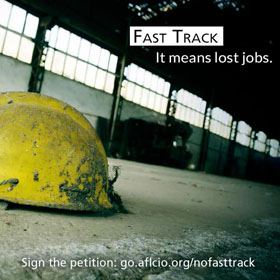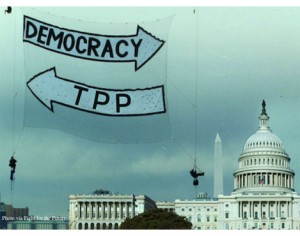OPINION
Congress trades away authority, responsibility with ‘Fast Track’
By LYNNE DODSON
(Jan. 21, 2015) — As the highly unpopular 113th Congress finished its second session, most of Washington’s Congressional delegation missed a great chance to stand up against an undemocratic procedure known as “fast track.” This 1970s-era tactic has been used to railroad the most controversial and damaging of U.S. “trade” deals through Congress.
Congressman Jim McDermott was the only member of Washington’s delegation to sign on to the DeLauro-Miller letter publicly opposing Fast Track. The rest of our delegation disappointed workers by declining to take a strong stand on this key issue.
 Since the fast tracking of the North American Free Trade Agreement (NAFTA), Washington state has lost nearly 29,000 manufacturing jobs. Nationwide, more than 5 million manufacturing jobs have been lost in the last two decades, with large numbers of service sector jobs now being offshored also.
Since the fast tracking of the North American Free Trade Agreement (NAFTA), Washington state has lost nearly 29,000 manufacturing jobs. Nationwide, more than 5 million manufacturing jobs have been lost in the last two decades, with large numbers of service sector jobs now being offshored also.
How did we get into this mess? Fast track delegated away Congress’ constitutional authority over trade, empowering the executive branch to unilaterally pick our trade agreement partners and negotiate and sign sweeping pacts, all before Congress got a vote. Fast track allowed these precooked deals to be steamrolled through Congress quickly, with no amendments allowed and debate strictly limited.
Washington state voters elect people to Congress to represent their interests, and to use their skills to defend and debate issues important to people in the state, not to delegate away their authority to U.S. trade negotiators, working in close coordination with hundreds of corporate lobbyists to finalize language in the “trade” deals.
TAKE A STAND! Please sign this petition urging your representatives in Congress to Stop Fast Track!
President Obama promised during his 2008 election campaign that he would replace fast track with a democratic process for negotiating and implementing trade agreements, and replace the NAFTA trade pact model with one that fosters U.S. jobs, public health, safe food and a clean environment.
Instead, President Obama aligned with global corporate interests and is now calling for fast track to be revived so that a NAFTA-expanding deal known as the Trans-Pacific Partnership (TPP) can be railroaded through Congress. This is an incredibly unpopular move — 62 percent of U.S. voters oppose fast tracking the TPP, and majorities of Democrats, Republicans and independents alike reject the status quo trade model.
President Obama recently acknowledged that doubling down on the NAFTA model via the TPP is unpopular outside of Washington’s corporate lobbies, acknowledging “a public perception generally that trade has resulted in an erosion of our manufacturing base as companies moved overseas in search of lower-wage labor.” As it happens, the public perception is backed up by U.S. government data that shows a massive $177 billion NAFTA trade deficit. To save face, Obama has attempted to paint the TPP as different from NAFTA.
 In reality, the TPP is NAFTA on steroids. It includes the same NAFTA provisions, and then builds on them. The TPP would expand NAFTA’s foreign investor privileges for companies that offshore American jobs to low-wage countries, such as Vietnam, where minimum wages are a fraction of those paid even in China. And like NAFTA, the TPP would ban Buy American procurement preferences that require U.S. tax dollars to be used to create U.S. jobs. Washington’s workers cannot endure another fast-tracked expansion of the NAFTA model.
In reality, the TPP is NAFTA on steroids. It includes the same NAFTA provisions, and then builds on them. The TPP would expand NAFTA’s foreign investor privileges for companies that offshore American jobs to low-wage countries, such as Vietnam, where minimum wages are a fraction of those paid even in China. And like NAFTA, the TPP would ban Buy American procurement preferences that require U.S. tax dollars to be used to create U.S. jobs. Washington’s workers cannot endure another fast-tracked expansion of the NAFTA model.
Just consider the most recent version — a fast-tracked 2011 “free trade” agreement with Korea that literally has served as the U.S. template for the TPP. In the first two years of the Korea agreement, the U.S. trade deficit with Korea in the top ten products that Washington exports to Korea — including everything from transportation equipment to agricultural products — ballooned 25 percent, costing more Washington state jobs.
Plus, TPP would also expand NAFTA’s monopoly protections for pharmaceutical corporations. That would mean fewer generics and pricier medicines. And the TPP would jeopardize the safety of our food by exacerbating NAFTA’s limits on inspections of food imported from TPP countries like Vietnam — a major seafood exporter cited by the U.S. Food and Drug Administration for widespread contamination.
The TPP also includes new corporate handouts, such as “copyright” rules similar to those in the notorious Stop Online Piracy Act that the American public and Congress rejected as a threat to Internet freedom. Even if fast track made sense back when trade agreements were actually about trade, it makes no sense now given all of the non-trade domestic policies that would be rewritten into today’s trade agreements.
To replace fast track, nearly 600 organizations representing millions of Americans have proposed a new, democratic system for negotiating and implementing trade agreements. It would deliver the benefits of expanded trade while safeguarding against the excesses of NAFTA-style pacts.
Our congressional delegation has another chance to join their many colleagues who support this new process and to clearly state their opposition to any attempts to revive fast track.
 President Obama recently defended his unpopular bid to fast track the TPP by saying that opponents should stop “fighting the last war.” Americans will stop fighting the last war when the president stops pushing the last trade model.
President Obama recently defended his unpopular bid to fast track the TPP by saying that opponents should stop “fighting the last war.” Americans will stop fighting the last war when the president stops pushing the last trade model.
Lynne Dodson is Secretary Treasurer of the Washington State Labor Council, AFL-CIO.





